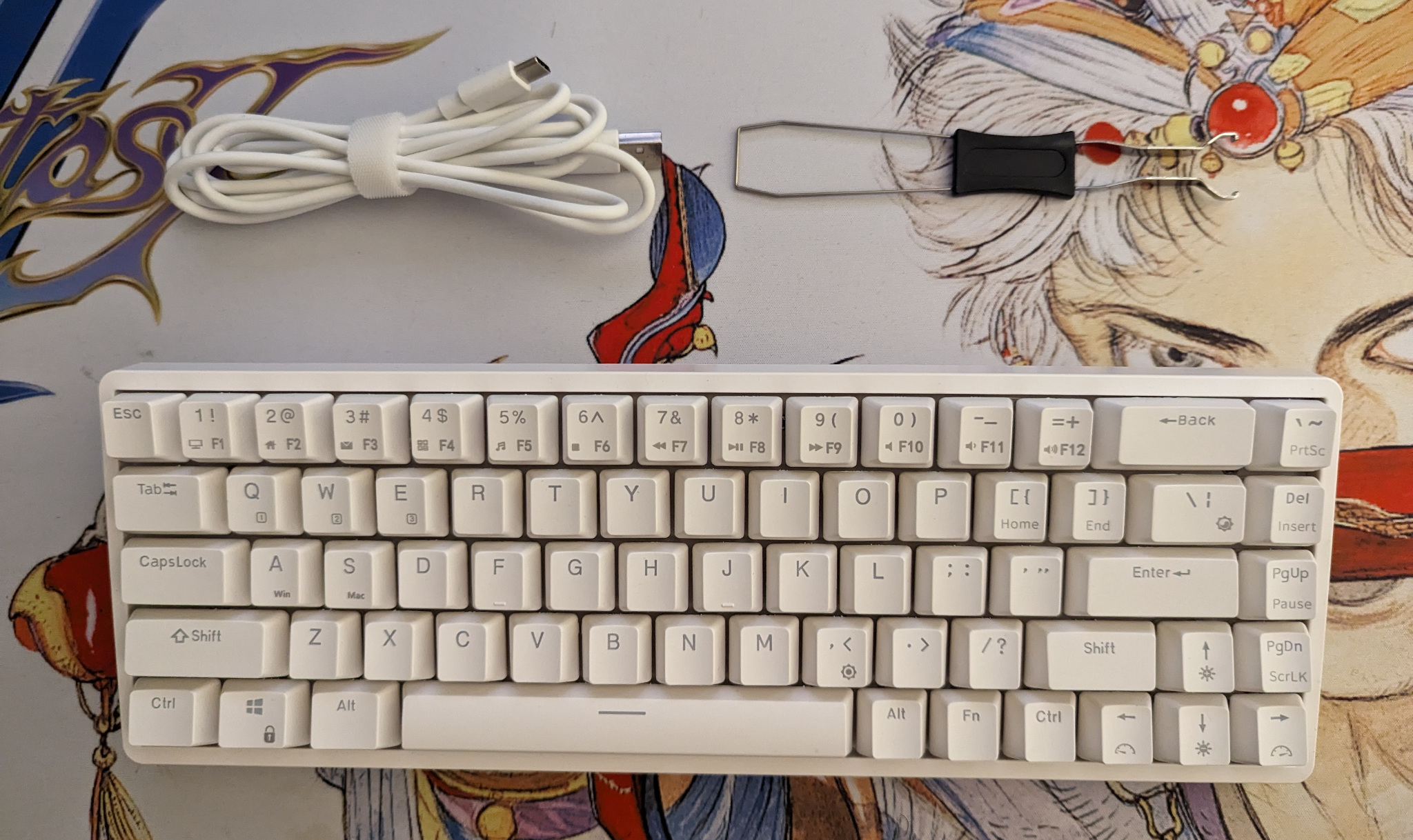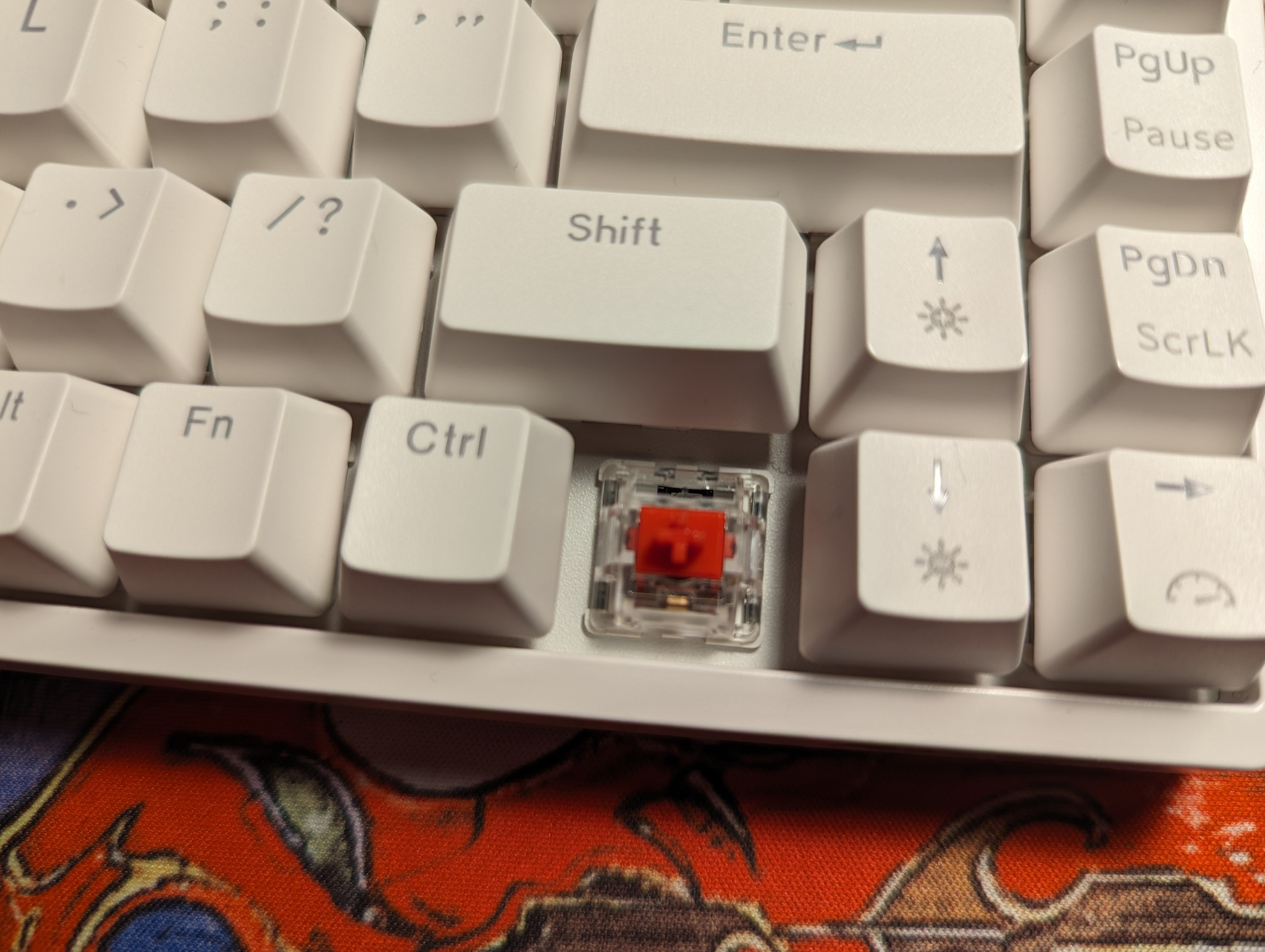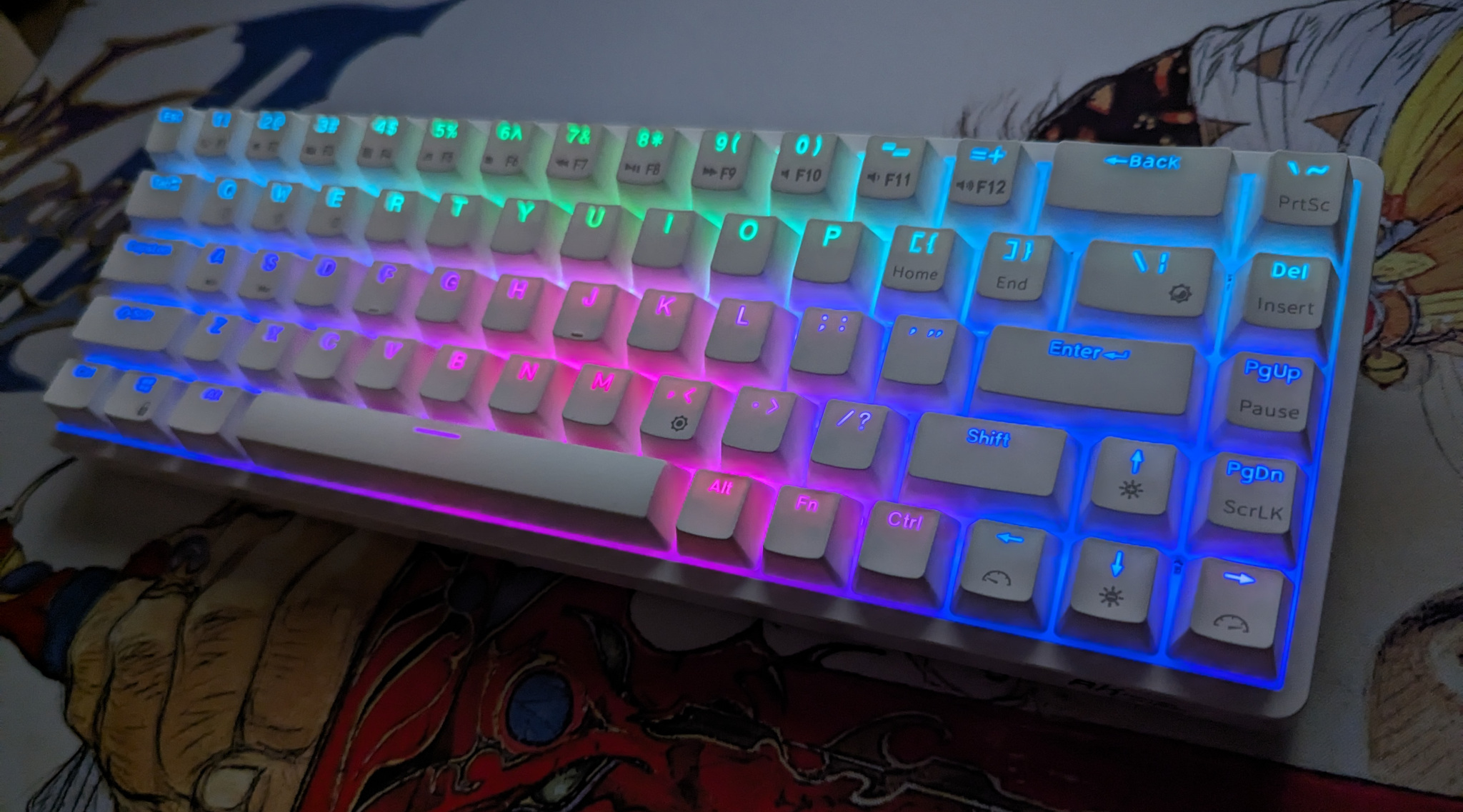Ah, the Royal Kludge RK68. Or is it G68? Or RK837...? I'm still a bit confused about the different versions of this keyboard. The version I have, however (labeled G68) has hot-swappable switches, support for three Bluetooth devices and a detatchable bezel. It arrived equipped with unbranded "RK" red switches (whereas—I think—some more expensive versions come pre-built with Gateron switches). And, in my opinion, it is gorgeous.

Sure, its design is quite simple, but I appreciate the minimalistic vibe it gives off. It's what initially sold me on this specific keyboard, and was a large contributing factor in my decision to finally pick it up. That, and the fact that it was a well-reviewed 65% keyboard at a very affordable price. When it finally arrived in the mail, I braced myself for the possibility of disappointment, given its modest price tag of around $40 USD. Yet, to my surprise, the RK68 proved to be anything but underwhelming.
My first observation was that the keyboard was unexpectedly heavy, even though the case is entirely made out of plastic. Not heavy in a cumbersome way, but rather in a way that gives off a sense of decent quality. I suspect the heft is due in part to the built-in battery and the stainless steel plate, but the case plastic also feels quite thick and solid; if I dropped it from my desk, I'd definitely be more worried about my floor getting damaged than the keyboard case shattering. The removable bezel appears a bit less durable, however (and seems to me to possibly be made from a different type of plastic) and would be more likely to lose a fight with my hard-wood floors.
I was also pleasantly surprised by both the sound and feel of typing on the RK68. Sure, the stainless steel backplate contributes to a noticeably stiff bottom-out feeling and there is some wobble on the unbranded red switches that is particularly noticable on the larger, unstabilized keys (Tab, Caps Lock, Right Shift). Neither the stiffness nor the slight wobble are dealbreakers, however. The OEM keycap profile isn't my favorite, and the plastic feels a bit on the thinner side. I woldn't fail the keyboard on any of these counts, however; the backplate, stabilizers and keycaps are good enough—just not perfect—and my dislike of the OEM profile is really just personal preference.

Despite some areas of improvement, the RK68 shines in others. The aesthetic of the OEM keycaps, with their clean, shine-through legends, is visually pleasing. The Fn-key sub-legends are clearly legible without being overly flashy.
I also find the sound of the RK68 to be quite a lot better than I had expected. There's a bit of stabilizer rattle on the Left Shift and Backspace keys, but it's minimal on the Enter key and Space Bar. The sound isn't too clacky, rather it's a muted mid-tone—subtle enough to not be a distraction, and far from the "cheap" sound I was bracing for.
Effortless Setup, Mostly
Setting up the RK68 was as straightforward as one would hope. Connecting to my PC via the 2.4 GHz dongle or USB-C cable was seamless, and the media keys functioned flawlessly in Ubuntu. Out of curiosity, I paired the keyboard with my phone using Bluetooth; that too went without issues. I've actually never tried using an external keyboard with my phone before, and it felt like a slightly surreal experience that really hammered home the fact that my phone is just a tiny single-board-computer with an integrated screen, that just happens to have an on-board 5G connection. Nevertheless, I doubt I will get much use of the Bluetooth connectivity, unless I decide to start carrying around a tablet instead of a laptop, like Ben Vallack. The default keybindings for missing keys like Home and End are sensible, and I haven't felt the need to delve into Royal Kludge's software for further customization, especially since it's Windows-only.
One hiccup I've noticed with the RK68 is related to its RGB settings. Specifically, the keyboard doesn't seem to remember the animation speed setting after being turned off. I find the default RGB animation speed too fast and distracting, and much prefer it on its slowest setting. If I turn the keyboard off and back on again, the animation speed is set to its default and I have to manually change it. Interestingly, other settings (like RGB mode and brightness) seem to be saved during power-off of the keyboard, just not the animation speed. It's a small nuisance since I don't have a habit of turning off my keyboard unnecessarily (the keyboard's automatic standby mode works well enough to save battery life), but a nuisance nonetheless.

The back of my G68 version of the RK68 boasts two USB-A ports that allow the keyboard to act as a USB hub. As I expected, these ports are inactive when the keyboard is connected using the 2.4 GHz dongle (the same seems to be true when connected via Bluetooth), which means they are of limited use if you intend to use the RK68 wirelessly. For a cabled setup, however, these extra ports can be quite handy for quickly connecting devices like flash drives.
Excellent Value
When I bought the Royal Kludge RK68 I did so with the mindset that I wanted to try out a cheap (but solid) 65% ANSI keyboard, to learn a thing or two about my own preferences before committing to a more expensive purchase. For someone more... sensible (and budget-minded) however, looking to enhance their typing experience without breaking the bank, I dedfinitely think it's a viable choice. The RK68 may lack high-end features like QMK support or gasket mounting, but it excels in delivering a solid, basic performance. Priced between $40 to $60, depending on sales, it's an excellent choice for both newcomers to the hobby and those seeking a reliable and pleasant typing tool.
Is the RK68 the absolute best in its class at this price point? It's debatable. The LTC Nimbleback and Keychron K6 seem like worthy competitors. However, the Nimbleback seemed inaccessible in Europe, and the lack of 2.4 GHz connectivity on the K6 was a dealbreaker for me. The Redragon K631 was another potential option, but I found its "budget gamer" aesthetic quite off-putting. So, during my online perusing, the RK68 seemed like the most attractive budget option, striking a balance between aesthetics, functionality, and price.
Though I've only owned and used the RK68 for a couple of weeks, it feels very durable, and I expect it to last for a good while. The keyboard is renowned for its moddability, and I look forward to future endeavors exploring different switches and keycap profiles, as well as more invasive mods.
What do you think? Have you used the RK68, or any other similarly priced keyboard? Should I have chosen a different one? What are some interesting mods to try out?